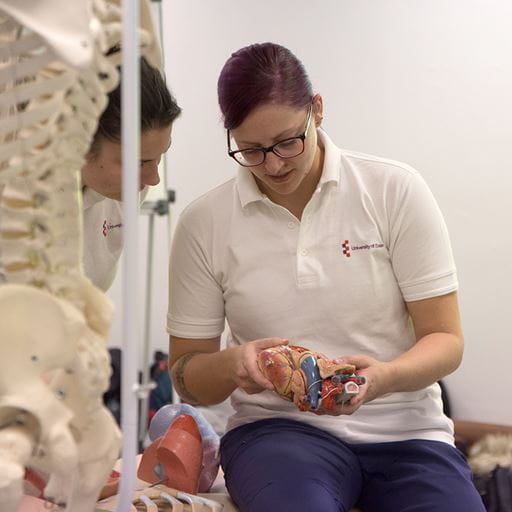Move your way into a new career
Our mission is to empower physiotherapy students to transform lives. We do this by facilitating experiences which allow learners to thrive by recognising, developing and leading through an enhanced understanding of themselves and others.
Please watch our Sport, Rehabilitation and Exercise Sciences Webinar for further information:
Our Higher and Degree Apprenticeships:
Physiotherapist – BSc (Hons) Physiotherapy
About the course and qualification
Our Physiotherapy Degree Apprenticeship supports apprentices to make the most of their unique opportunities and develop enquiring minds through the combination of practice and research lead learning.
Our apprenticeship programme is suitable for existing staff such as therapy assistants and support workers and people new to the health and social care sector.
It usually takes 39 months to complete the programme (41 including the EPA period) which has been designed to be progressively demanding, professionally and academically, so that by the end apprentices can demonstrate mastery of the knowledge and skills specified in the level 6 national apprenticeship standard and those required to apply for Health and Care Professions Council registration and full membership of the Chartered Society of Physiotherapy.
How to Apply
Employer nominations for October 2025 can be made via apprenticeships@essex.ac.uk. Nomination deadline: CLOSED FOR OCTOBER 2025 INTAKE. Nominations will open again in January 2026.
Course content and delivery
Apprentices will spend approximately 60% of their time in their work-place completing tasks set out in their job descriptions by their employer, and 40% either attending university teaching, developing practice skills, completing personal study tasks or attending placements.
Spread across years 2,3 and 4 apprentices complete four practice placements in health and social care services outside of their employing team. These learning opportunities are identified collaboratively to meet the specific development needs of the apprentice. They are essential experiences that enable apprentices to apply their evolving expertise, develop their scope of practice and appreciate the diverse carer options Physiotherapy has to offer.
Course modules
The modules have been designed around 4 themes: development of self and others, professional craft skills, propositional skills and preparation for qualified practice.
| First Year | |
| Applied Anatomy and Pathophysiology | This module will allow apprentices to develop their knowledge and understanding of the pathophysiology and anatomy of the human body. This will allow apprentices to consider the impact of pathophysiology on structure, function and wellbeing of the individual. |
| Practice Based Decision Making | This module will give apprentices knowledge and understanding of the academic skills required for life-long learning. This will include critical thinking and academic skills such as searching, retrieving, appraising and reporting evidence to allow to apprentices to begin to engage with evidence-based practice. |
| Understanding Self and Others | Apprentices will consider their own lived experiences, along with those of others through the contexts in which they live. Apprentices will discuss and develop their understanding of being a Physiotherapist, focusing on what this means in contemporary and evolving UK practice. They will also, and consider their own development as a student healthcare professional. |
| Physiotherapy Led Assessment | This module will allow apprentices to develop holistic assessment skills for a range of patient presentations. The module will focus on the common approaches to physiotherapy led assessment, whilst highlighting and exploring the variations required when assessing different patient groups. |
| Second Year | |
| Developing Self and Others | This module will draw upon learning and understanding from the module Understanding Self and Others, to enable apprentices to apply, evaluate and analyse various approaches to developing themselves as professionals, and others such as service users and peers in a variety of contexts. This module will consider the opportunities and challenges of upcoming placement experiences, with a view to the ongoing development of the self, and others. |
| Physiotherapy Led Interventions | Apprentices will develop holistic intervention skills for a range of patient presentations across different medical specialities. The module will focus on the common approaches to physiotherapy led intervention, whilst highlighting and discussing the any variations required when managing different patient groups, thus preparing apprentices for some of the multi-faceted clinical presentations seen in practice. |
| Promoting Health and Activity | This module sets out to allow apprentices to explore the expanding role of physiotherapy in the wider context, by promoting healthy choices and activity throughout the lifespan (infancy, childhood, adolescence, adulthood, old age, end of life). Apprentices will explore the links between lifestyle choices and the effects on well-being, and will learn skills in promoting the use of activity and healthy behaviours. This knowledge and skills will be discussed in relation to physical, mental and social health of individuals, families, communities and societies. |
| Research Methods | Apprentices on this module will develop an understanding and appreciation of research and evidence informed practice, building on the Level 4 module (Practice based decision making) where the paradigms and basic literature search skills have been introduced. This is a more advanced module where the apprentices will provide clear rationale for the evidence they have chosen based on the critique of the literature. Apprentices are expected to select a topic relevant to their own profession and inter-professional specific interest. |
| Placement 1 | |
| Third Year | |
| Leadership of Self and Others | Apprentices will consider their own development as future leaders, recognising how the contexts in which they will practice, are constantly evolving. Apprentices will learn about the concepts and theories of leadership, and will begin to develop skills to enable them to lead their own develop and that of others, in preparation for qualified practice. |
| Research Project | Apprentices will be provided with experiences relating to how social researchers go about applying their skills and knowledge in an empirical investigation. Apprentices will be supported to identify a topic they find interesting, and wish to learn more about. Apprentices will then be facilitated to plan the organisation and timing of their work with a high degree of independence and self-motivation. |
| Placement 2 | |
| Placement 3 | |
| Fourth Year | |
| Preparation for Professional Practice | Apprentices on this module will be facilitated to be proactive in identifying their current scope of practice. Reflecting upon this, apprentices will then identify and develop strategies to expand knowledge and skills in their own chosen areas. Based upon these areas, apprentices will be able to select sessions to attend in order to proactively develop their current scope of practice. |
| Placement 4 | |
Course structure
As part of the assessment plan you will complete a variety of assessment methods, including:
- Essays
- Presentations
- Short answer written papers
- Viva
- Research Project/Dissertation
- Portfolio Development
- Video analysis
- Blog writing
Entry requirements
To be eligible to be an Apprentice you must be in current employment within a relevant occupational role in a suitable setting (normally for a minimum of 30 hours a week), with agreement from the employer to be supported.
Our usual entry requirements for this course are:
- An acceptable level 2 Mathematics and English qualifications such as GCSE grade C/4, OFQUAL regulated level 2 maths or English qualifications, including Functional Skills level 2, Key Skills level 2 numeracy units taken as part of an Access to HE Diploma for applicants or for whose first language is not English: IELTS 7.0 overall with a minimum of 6.5 in each component, or specified score in another equivalent test that we accept. If you have any other English and Maths qualifications at level 2, please contact the Apprenticeship Hub at apprenticeships@essex.ac.uk and we can confirm if these are acceptable
- Level 3 qualification with a natural science focus. For example A Levels/BTEC (115 UCAS Points)
- Current employment within a relevant professional practice setting with agreement from the employer to be supported
- Alongside academic criteria, applicants need to demonstrate knowledge of the scope of physiotherapy as a profession, together with effective communication
- Disclosure and Barring Service (DBS) and Occupational Health clearance with relevant immunisations
There are no tuition fees to pay as your employer pays these for you. That means you will earn while you learn.
For our Full Time Option (non-apprenticeship route) please see: Physiotherapy | Subject area | University of Essex
Why study
with Essex?




Boost your business with our training for apprentices and advice on making the most of your Apprentice Levy.
The University makes every effort to ensure that this information is accurate and up-to-date. Occasionally it can be necessary to make changes, for example to courses, facilities or fees. Examples of such reasons might include a change of law or regulatory requirements, industrial action, lack of demand, departure of key personnel, change in government policy, or withdrawal/reduction of funding. Changes to courses may for example consist of variations to the content and method of delivery of programmes, courses and other services, to discontinue programmes, courses and other services and to merge or combine programmes or courses. The University will endeavour to keep such changes to a minimum, and will also keep prospective students informed appropriately by updating our programme specifications.
The full Procedures, Rules and Regulations of the University governing how it operates are set out in the Charter, Statutes and Ordinances and in the University Regulations, Policy and Procedures.




